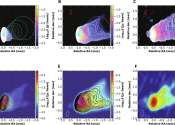Microprinting millions of microparticles in the blink of an eye through multi-photon 3D laser printing
Multi-photon 3D laser printing has revolutionized miniature fabrication, but limitations in speed and material compatibility have held it back. Now, researchers have taken a giant leap forward, achieving a tenfold increase ...









